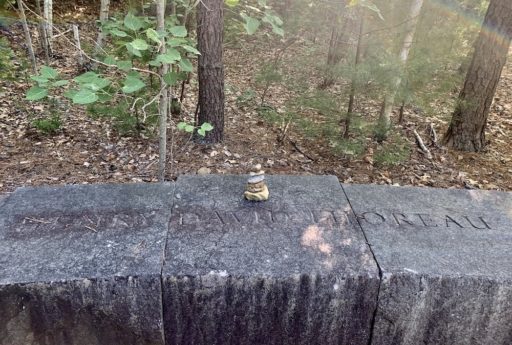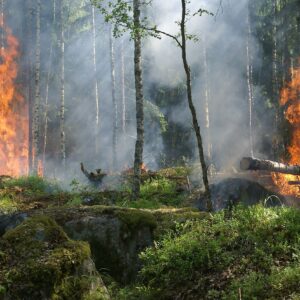Henry David Thoreau was a profoundly religious man. He is called a Transcendentalist, and the term is taken to mean a kind of hippie or New Age guru, perhaps something like the founders of the Deep Ecology movement. That’s nonsense. Thoreau was a Yankee, the near descendent of (the grossly misunderstood) Puritans, and he comported himself as such in his life and thought. Between Jonathan Edwards and Thoreau there are no missing links. And from Edwards it is a straight and narrow way back to Hildegard and Eriugena and the great holistic medieval enchantment that beheld all creation as theophany.
But Thoreau’s religiosity ramifies more widely even than that European and Christian allusion suggests. He went into the wilderness and learned there the lineaments of a new Law. His religion is the religion of the future. But it is also yet the ancient Western faith: in God the creator, revealer, and redeemer of his fallen creation. Thoreau was a man on a quest, like the Shekhinah in her long romance, her much thwarted journey to return to God; or like the Kabbalist in his search for the scattered sparks of the divine light which, when gathered all together, will make a world greater than this one. But we do not get to that world except through this one.
I am at work on a strange book-length essay that searches in the writings of Thoreau and Tolkien for the faith I can live into, the faith into which I can raise my sons. Shortly after the pandemic began, I started going back through everything Thoreau wrote or is known to have said. What follows are a few passages I wish were better known and more carefully considered.
Thoreau heard the universal music, the music of the spheres, as he tells in his poem “Music.” And he was a modern man, like us, so he complains of that music:
Ah, I have wandered many ways and lost
The buoyant step, the whole responsive life
That stood with joy to hear what seemed then
Its echo, its own harmony borne back
Upon its ear.
It is his “sin” and “distrust” (which latter, as he well knew, could mean the same as faithlessness) which caused him to lose the music. But he realizes that his life, though “a frail tenement,” still catches the faint echo of the music, and:
Perchance the God who is proprietor
Will pity take on his poor tenant here
And countenance his efforts to improve
His property and make it worthy to revert,
At some late day unto himself again.
It is the most basic prayer. Thoreau is also poking fun (as he often does and will again below) at the Yankee penchant for “improving” oneself and one’s time and place. He knew just what culture he came out of and accepted it—no more or less. In Quebec he was struck by a different culture, and saw there the possibility of a different religion than the one he had known. Of Notre Dame in Montreal he said this:
I was impressed by the quiet religious atmosphere of the place. It was a great cave in the midst of the city; and what were the altars and the tinsel but the sparkling stalactites, into which you entered in a moment, and where the still atmosphere and the somber light disposed to serious and profitable thought? Such a cave at hand, which you can enter any day, is worth a thousand of our churches which are open only Sundays… a church where the priest is the least part, where you do your own preaching, where the universe preaches to you and can be heard.
Contemplation was what Thoreau was after, and mythos. He became ever more interested in the American Indian and wanted to do the same thing Tolkien wanted to do for England: to go down to the deepest roots (for Thoreau, that meant the Indians) and found the national mythos on what he unearthed there. He had a philological bent like Tolkien as well. When he went to Maine, Thoreau traveled with Indian guides and learned some of their language. His last intelligible words were “Indian” and “moose,” as he was working to his last day on the book, comprising three sections, posthumously published as The Maine Woods. Here is part of the new revelation of the Law, as I think of it, that Thoreau learned there. He is speaking of phosphorescent wood:
I was exceedingly interested in this phenomenon, and already felt paid for my journey. It could hardly have thrilled me more if it had taken the form of letters, or of the human face. If I had met with this ring of light while groping in this forest alone, away from any fire, I should have been still more surprised. I little thought that there was such a light shining in the darkness of the wilderness for me…
The combination of the biblical images of the wilderness and that of a light shining in the dark is intentional, of course. Later in his description of this encounter he alludes to God’s blessing of his creation (my emphasis), which is enchanted, alive throughout:
I let science slide, and rejoiced in that light as if it had been a fellow-creature. I saw that it was excellent… A scientific explanation, as it is called, would have been altogether out of place there. That is for pale daylight. Science with its retorts would have put me to sleep; it was the opportunity to be ignorant that I improved. It suggested to me that there was something to be seen if one had eyes. It made a believer of me more than before. I believed that the woods were not tenantless, but chock-full of honest spirits as good as myself any day—not an empty chamber, in which chemistry was left to work alone, but an inhabited house—and for a few moments I enjoyed fellowship with them. Your so-called wise man goes trying to persuade himself that there is no entity there but himself and his traps, but it is a great deal easier to believe the truth. It suggested, too, that the same experience always gives birth to the same sort of belief or religion. One revelation has been made to the Indian, another to the white man. I have much to learn of the Indian, nothing of the missionary. I am not sure but all that would tempt me to teach the Indian my religion would be his promise to teach me his. Long enough I had heard of irrelevant things; now at length I was glad to make the acquaintance with the light that dwells in rotten wood.
Walter Harding, in his biography The Days of Henry Thoreau, reports that in his last weeks “He realized fully that the end was near…. When Edmund Hosmer told him of seeing a spring robin, Thoreau replied, ‘Yes! this is a beautiful world; but I shall see a fairer.’” This is the essential religious disposition, expectation of the world to come, and—such is the paradox of the transcendental—we must recover it if we are to safeguard this world.
Jonathan Geltner lives in Ann Arbor MI with his wife and two sons. His translation of Paul Claudel’s Five Great Odes is available from Angelico Press and a novel, Absolute Music, is available from Slant. If you enjoy his posts at Close Reading, check out his new Substack, Romance and Apocalypse, for more frequent and in-depth essays on the places where literature and other arts meet religious ideas and experience.





